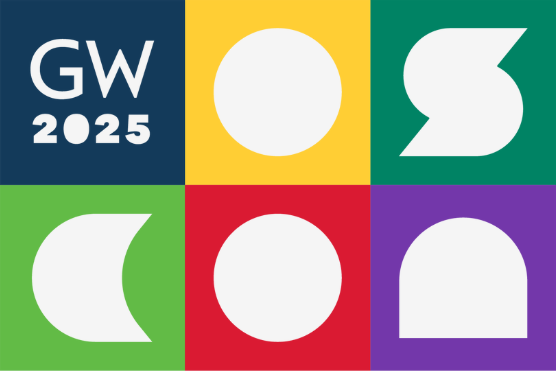The inaugural George Washington University Open Source Conference (GW OSCON) has officially wrapped up, and what a success it was! Over 180 pre-registered attendees plus dozens of on-site registrations gathered at GW's Foggy Bottom campus in Washington, D.C. on March 24-25, 2025, making this first-ever conference hosted by the GW Open Source Program Office (OSPO) an exciting milestone for our university.
The event brought together a diverse community of students, faculty, researchers, industry professionals, and government representatives, who enjoyed vibrant discussions and connections across sectors.
This successful launch was possible thanks to the support from the Alfred P. Sloan Foundation, whose grant to the GW OSPO enabled us to bring this vision to life.
Open Source: A Philosophy for Knowledge and Resilience
Throughout the conference, a central theme resounded: open source is far more than just software—it's a philosophy of collaboration, transparency, and shared innovation.
As universities nationwide face unprecedented challenges, from funding constraints to questions about relevance, the open source model offers a compelling framework for reimagining how academic knowledge is created, shared, and sustained. When resources are limited, open source allows us to distribute costs and responsibilities across networks. When trust in expertise erodes, open source provides transparency and reproducibility.
Open practices demonstrated at the conference showed how this approach builds resilient networks that strengthen the entire knowledge ecosystem, while offering practical solutions to complex societal challenges.
Keynote Speakers: Vision and Impact
The conference featured three outstanding keynote speakers who set the tone for our conversations:
Dr. Steve Crawford from NASA kicked off day one with an illuminating presentation on "Open Source Software at NASA." He showcased how open source plays a critical role in NASA's missions and scientific achievements, from the Ingenuity helicopter to the James Webb Space Telescope calibration software. Dr. Crawford also highlighted NASA's open science activities and opportunities, inspiring attendees with real-world examples of open source impact.
Andrea Fletcher and Remy DeCausemaker from the Centers for Medicare and Medicaid Services began day two by sharing their journey of "Running The First Federal Open Source Program Office at CMS.gov." Their insights demonstrated how adopting an open source strategy helps their agency reduce risks and costs while improving transparency and building public trust. One striking example they shared was their bug bounty program which alleviated $180 million in vulnerabilities!
Prof. Keith Crandall from GW Computational Biology Institute concluded the conference with his thought-provoking talk "From Open Source to Open Science." He addressed the revolution that open source software has brought to science, particularly in bioinformatics, including his own ModelTest software. Prof. Crandall also candidly discussed the ongoing obstacles in making data and publications more open, giving attendees a balanced perspective on the work ahead.
Additionally, featured speakers like Inessa Pawson (OpenTeams) and Brandon Tabaska (Nava) shared valuable expertise on bridging academia and open source, and embracing Open Source GovTech, respectively.
Engaging Sessions and Diverse Perspectives
The conference program was packed with a variety of sessions showcasing the breadth of open source work happening at GW and beyond. Regular sessions spread across multiple tracks covered everything from civic tech and reproducible data science to open source in research workflows and AI applications.
Two panel discussions were particular highlights:
The panel on Discovering & Fostering Inviting Open Source Project Communities explored the critical role of community in open source projects. Moderated by Geneva Henry, GW Vice Provost for Information Technology, panelists Naty Clementi (NVIDIA), Inessa Pawson (OpenTeams), Max Turer (GW Library & Academic Innovation), and Mio Diaz (Capital One OSPO) shared insights on identifying welcoming projects and creating inclusive environments.
The panel on Open Source Artificial Intelligence offered a critical examination of what genuinely open source means in AI, distinguishing it from open weights models with restrictive licenses. Led by Prof. Lorena A. Barba, panelists Sayeed Choudhury (Carnegie Mellon University), Dr. Ray Bell (State of Maryland), Wing Lian (Axolotl), and Anastassia Kornilova (Trustible AI) engaged in thought-provoking discussions about transparency, ethics, and cross-sector collaboration.
One of the most dynamic portions of the event was the lightning talks session, where students and members of the broader Washington DC open source communities shined with their five-minute presentations. The energy and enthusiasm during these rapid-fire talks perfectly captured the spirit of innovation that drives the open source movement.
The conference also included the "Public Sauce" art show and reception, adding a creative dimension that highlighted the intersection of open source principles and artistic expression.
Building Connections and Community
Beyond the formal sessions, OSCON succeeded in fostering meaningful connections across disciplines and institutions. The Continental Ballroom buzzed with conversations during breaks, while The Contributor Hub (room 301) provided a cozy space for coffee, pastries, and continued discussions.
We're especially grateful to our sponsors whose support was crucial to the event's success: Gold Sponsor OpenTeams, Silver Sponsors Simpler Grants, Posit, Cambridge Computers, and Prefect, and Bronze Sponsor AWS.
Looking Ahead
As the GW OSPO continues its work supporting open science and open source, we're excited to build on the momentum from this first conference. Through our ongoing initiatives, workshops, and training programs, we'll continue to advance the open source mission at GW and beyond.
To everyone who made this first GW OSCON possible—the organizers, speakers, sponsors, and enthusiastic attendees—thank you! Your participation and engagement created a truly memorable and successful event that has set a high bar for future conferences.
We can't wait to see you at GW OSCON 2026!
The GW Open Source Program Office (OSPO) was established with support from the Alfred P. Sloan Foundation. To learn more about our initiatives or get involved, visit our website or contact us at ospo gwu [dot] edu (ospo[at]gwu[dot]edu).
gwu [dot] edu (ospo[at]gwu[dot]edu).

Content licensed under Creative Commons Atribution International 4.0


